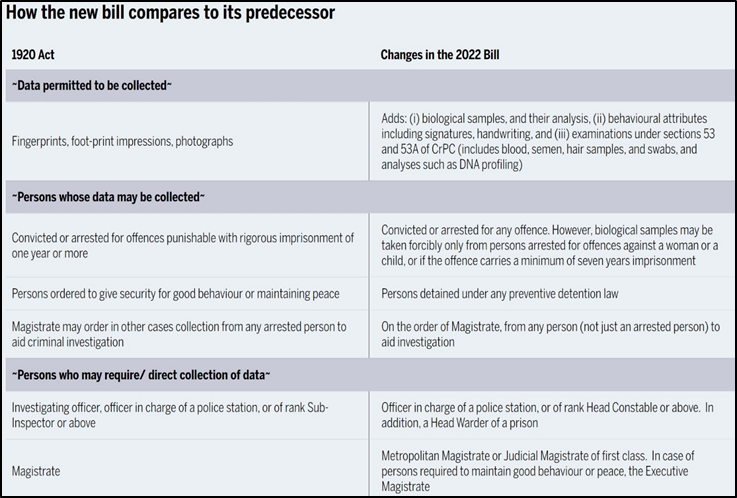In News:
- The Criminal Procedure (Identification) Act, 2022 has come into effect from August 4th. It replaced a similar colonial era law - The Identification of Prisoners Act, 1920.
- It authorises taking measurements of convicts and other persons for the purposes of identification and investigation in criminal matters and to preserve records.
What’s in Today’s Article:
- Criminal Procedure (Identification) Act, 2022
Criminal Procedure (Identification) Act, 2022
- The law has been enacted with an objective to ensure the unique identification of those involved with crime and to help investigating agencies solve cases.
- It was passed by the Parliament in April 2022. The primary motive cited by the government behind the introduction of the Act is to increase the rate of convictions.
Key Provisions
- Empowers police to collect physical and biological samples of convicts as well as those accused of crimes.
- Storage and sharing of data
- The act authorises the National Crime Records Bureau (NCRB) to store, preserve, share with any law enforcement agency and destroy the record of measurements at national level.
- The records will be destroyed only after the prisoner exhausts all legal remedies. So, no deletion if the prosecution appeals an acquittal.
- The records can be stored up to a period of 75 years.
How different it is from the 1920 law?

Criticism
- Not in line with the global standards
- Some of the clauses in the law violate Article 17 of the International Convention on Civil and Political Rights.
- The Article 17 prohibits interference with privacy and attack on a person's honour and reputation.
- It also makes inroads into Rule 65 of the UN Standard of Minimum Rules for the treatment of prisoners that encourages their self-respect.
- Overlooks the basic rights of innocent individuals
- The act empowers police to take measurements of those who are undertrial and suspected to be involved in a case.
- Hence it works on the presumption that they may, in future, commit any illegal act.
- Safety and security of data
- Critics argue that the law fails to put in place adequate restrictions on storage, sharing, or usage of the collected data of accused.
- No provisions for an appeal
- It has no provisions for an appeal to a higher authority against any arbitrary exercise of power by an authorised entity to collect an individual's personal data.
- Therefore, by default, any remedy for abuse of power will be sought before the High Courts or the Supreme Court.
- Open to political misuse
- Critics expressed their concern over the possible misuse of the act to serve the political agenda of the govt in power.
- This fear stems from the way officials used biometric data in the past, notably against crowds who were peacefully protesting the Citizenship Amendment Act in Delhi and Uttar Pradesh in 2019-20.
- Unawareness among Detainees
- Although it provides that an arrested person (not accused of an offence against a woman or a child or the offence that carries a minimum of seven years imprisonment) may refuse the taking of samples, not all detainees may know that they can indeed decline to let biological samples be taken.
- Broad definition for 1st case: For example, it could include the case of theft against a woman. Such a provision would also violate equality of law between persons who stole an item from a man and from a woman.
- Unbridled discretionary power has been given to police and prison officers
- They can force any accused to give measurement which is in conflict with right against self-incrimination i.e., no person can be forced to give a witness against himself under Article 20(3) of the constitution.









